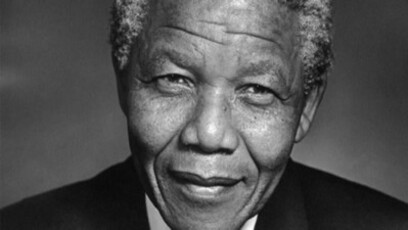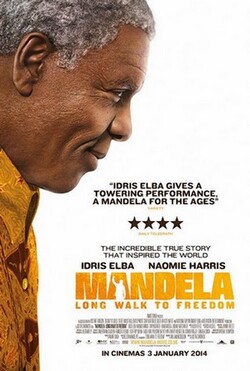-
Par 1 euro Lycée Leclerc le 25 Mars 2014 à 12:10
Myths and Heroes
Written by Anne-Marine Goetz
A myth can be defined as a story about goods or heroes; it can be a popular belief or a traditional or false notion. It relates the exploits of a man endowed with extraordinary value and destined to carry out glorious exploits.
A hero can be a mythological figure, a person who is admired for his or her achievements, a superhero or maybe a role model or an icon. The concept of the hero is consubstantial with that of myths they evolved together through the ages.
Myths are stories we believe in and heroes are people who help others and symbolise moral values.
Examples of heroes:
- - A patriotic or national hero (sportsman, political, human rights defender…)
- A fictitious hero (superhero or film star)
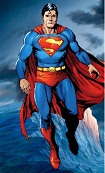
- An icon or role model (fashion, TV, music)
-
A- - A defender of common values

- - A politician, King, Queen who has achieved international recognition

Nelson Mandela:

Rolihlahla Mandela was born in Transkei, South Africa on 18 July 1918 and died in Johannesburg on 5 December 2013. Nelson was the name given by Miss Mdingane. It was a tradition to give English name in African school.
He is well-known to be the first black president in South AfricaHe was elected in 1994 and served until 1999.
He had four children with Evelyn Ntoko Mase, his first wife and two other children with Nomzamo Winnifred Madikizela, his second wife. But he will spend the rest of his life with his third wife: Machel Graça.
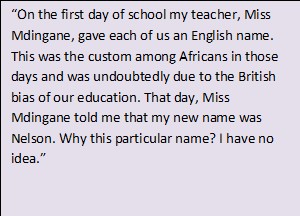
Since his childhood, he was in a sort of political world. Mandela’s father was a part
of the royal lineage of the Thembu dynasty, thereby he had the leadership. When his father died of tuberculosis in 1927, he bequeathed to his son the title of chief.

One day, he decided to leave the tribe and went to Johannesburg. He was taken on as an articled clerk. He became more and more interested in law and in politics. As a result, Oliver Tambo and himself opened in 1952, the first legal firm in Johannesburg that was led by black lawyers. He also helped to create the ANC (African National Congress) Youth League. Accordingly, he fought against apartheid, poverty, racism and inequalities. Moreover, during his serving as the President of South Africa, his government focused on his battle and on the fostering racial reconciliation too.
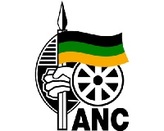
Mandela served 27 years in prison because he was accused of conspiracy to overthrow the regime. Normally, he should have stayed his entire life in prison but the population saw Nelson Mandela as an icon of (political) struggles. It was only in 1990, with Frederik De Klerk's agreement that Mandela was liberated.
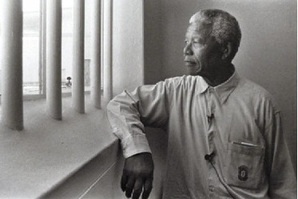
In 1993, the Nobel Peace Prize was shared between Nelson Mandela and Frederik De Klerk for their fight against apartheid. Four years later, it was not surprising that Nelson decided to sit on for the title of the President of South Africa, and he won . He became the black people’s superhero and the first black president in South Africa because of his love and sacrifice. He wanted South Africa (or the entire world) to be a “Rainbow Nation” without confrontation or war but with peace and love for everyone.
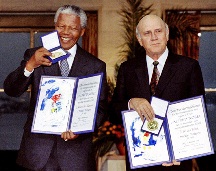
Why is Nelson Mandela a hero?
Nelson Mandela wanted to unify a divided nation and to reconcile decades of pain and racism. He dedicated his entire life to fight against apartheid, injustice, and racism and fought for his country to become a “Rainbow Nation” . (Whites, coloured, Indians, Africans live in cohabitation)
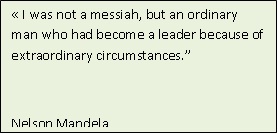
During his prison time, he kept his personal integrity and didn’t stop thinking he did the right thing for his compatriots. Nelson was really brave; he refused to bow to pressure, to accept injustice to keep himself out of prison. When he went out, and threw himself back to life, he continued his project. He always put the cause of justice and freedom from oppression before his own life and safety. It means that his fight for freedom for black people was the most important for him. That’s an act of bravery!
He knew how to speak to black people, and to put away his, and their thirst of revenge. He reckoned what the whites did for the good to build a new South Africa. Mandela continuously chose to learn from his mistakes rather than repeat them.
Before he was arrested, he tried not to work with violence but with his words and ideas. But the police searched him, and he was called “the Black Pimpernel” because of his success for moving to one place into another in a small time and consequently evading the police.
With his admirable patience and wisdom, he gave to black people energy and strength for their future life. This “terrorist” became the saviour for black people and finally a revolutionary president of South Africa!


First scenes of “Invictus”
The opening scene shows the sharp divide. On the one hand, we can see a school team with white boys with fancy clothes who are playing rugby in a beautiful field with spiked fences. On the other side, black boys are playing soccer without a proper field, just for fun. The tone is set; it talks about the segregation between black and white people. The first scenes show the inequalities between the two different worlds. It shows the real situation of South Africa before the Presidential election.
The movie director decides to show alternatively the white world and black world with François’ house and family and a picture of a township.Later, he shows Nelson Mandela's " presidential house", built with white standards.Yet, the new president -but former prisoner-is seen making his bed,as he used to do in Robben Island.
He uses the slum, the kitchen with black women as opposed to real houses, and the city centre to underline the differences between both worlds.
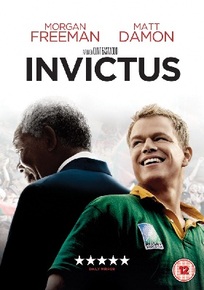
Most white people think Nelson Mandela isn’t a good person: “This is the day when our country went to the dogs”. It means that Nelson Mandela’s liberation will have consequences: here , the chaos of the country.
The whites came to South Africa to colonize it, and take the power without the consent of the black people.
This is the real scene with Nelson Mandela; he gave the Webb Ellis Cup to the South African captain François Pienaar. (1995)

Other reports or documents:
- Nelson Mandela, Le Réconciliateur. (Arte)
- Nelson Mandela, Leçon de vie pour l’avenir. (Book)
 3 commentaires
3 commentaires
-
Par 1 euro Lycée Leclerc le 25 Mars 2014 à 10:01
MYTHS AND HEROES
written by HUPPERT Camille and MATHIS Emilie
A myth can be defined as a story about gods or heroes, it can be a popular belief or a tradition or a false notion. A hero can be a mythological figure, a person who is admired for his or her achievements and help others and symbolise moral values.
Nelson Rolihlahla Mandela, also known by his tribal name Madiba, was the first black president of South Africa. He was born on July the 18th 1918 in Mvezo and died on 5th December 2013 in Johannesburg. He got a law degree in 1942 at the University of Witwatersrand in Johannesburg; then he joined the ANC, African National Congress, which is a moderate political party of the black bourgeoisie. In 1945 the Apartheid became official, so Mandela who was at the head of the ANC(African National Congress) fought against it, and after many arrests and trials, he was sentenced in 1964. He had to go to Victor Verster prison. Nelson Mandela was finally released on February the 11th 1990 after spending 27 years in prison. Moreover, in 1991, he was elected president of the ANC which was legalized by the government of South Africa. On April the 27th when he participated for the first time to free elections for both white and black communities, he was elected President , on May 9th. His term was marked by the will to set up a "rainbow nation”. Black people , mixed people and white people were represented in Parliament as a symbol of reconciliation. He was the President until 1999. Besides, he founded the Nelson Mandela Foundation and devoted himself to the fight against AIDS after the death of one of his sons in 2005.
I think Nelson Mandela was a hero because he managed to reunify South Africa and he gathered black and white people. He was the first black president after 27 years in prison, and I am impressed that he managed to get over his imprisonment and to become the symbol of the fight for racial equality. Moreover, he put an end to the apartheid and fought against racial segregation. Nelson Mandela also fought against the political domination of the white minority and he put in place a reconciliation policy, this is why he received a Nobel Peace Prize with Frederik de Klerk, (the last white South African President) which shows once again that Nelson Mandela was a peace hero. Besides, he fought against economic inequalities and he avoided a civil war between the supporters of the apartheid and those of the ANC. Finally, we can say that Nelson Mandela was really a hero since he brought peace to his country and between the people living there, even if the country he loved let him 27 years locked in prison. He was a hero because he was able to forgive, and help the others to do the same.
I find that the first scenes of « Invictus » show the end of apartheid. When Nelson Mandela was released from prison, he drove past a football ground for blacks and the rugby field for the whites. We can guess the big gap between the two communities, when we watch the rugby gear, the well mown lawn of the field and the black teenagers in rags on the other side of the road. Sport will later become the symbol of reconciliation and the link between the two communities. Mandela was the only possible solution for South Africa to bring peace to his country. Then, we can see Mandela and his everyday life, and we can infer that he is a simple and modest man. Moreover he is frank with his staff and he has good values : he doesn't make any differences between blacks and whites. We can deduce that Mandela is shown as a really great man who remains humble at the beginning of the film.
I saw another film about Nelson Mandela entitled « Long Walk to Freedom » which was released a few days before his death. It is a biography which talks about Mandela's childhood, his political career, his fights against apartheid and his years in prison. I found that film very stirring and I really liked the performance of Idris Elba.
 1 commentaire
1 commentaire Suivre le flux RSS des articles de cette rubrique
Suivre le flux RSS des articles de cette rubrique Suivre le flux RSS des commentaires de cette rubrique
Suivre le flux RSS des commentaires de cette rubrique

